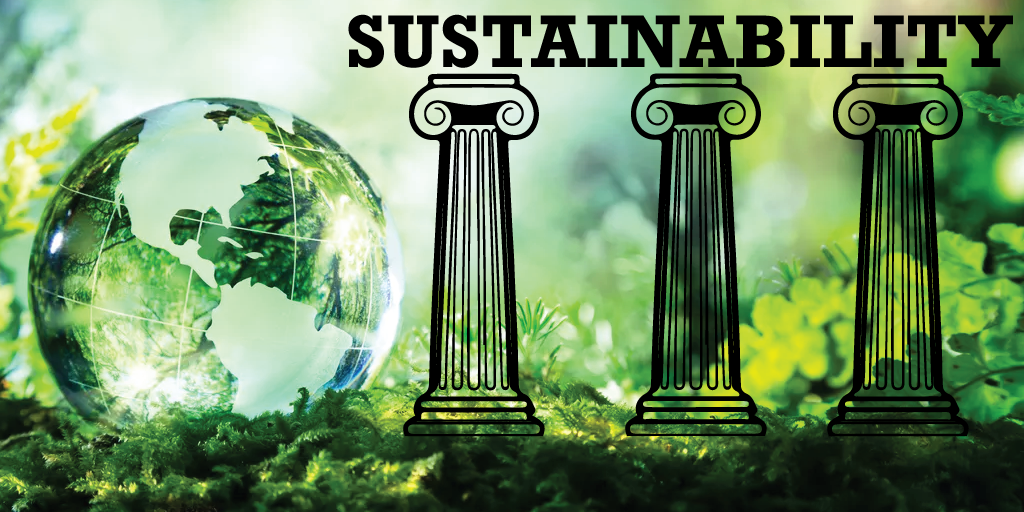3 Pillars of Sustainability
When you think sustainability most people think, carbon foot prints, green houses gases, and waste. The whole notion of Sustainability is much larger than that.
What is sustainability?
Sustainability is being able to meet our needs with out compromising or harming the environment, this will allow for future generations to meet their needs. There are many different forms of sustainability, the three largest are Environmental, Economy, and Social Responsibility.
While the notion of sustainability is fairly recent, sustainability is something we have been adapting to for decades, on all counts, not just the recent up-rise in concerns for our environment, and global warming. But also for the individual economies and social justice. It was in the 1980’s when the United Nations and former Norwegian prime minister Gro Harlem Brundtland created and took on the World Commission in Environment and Development1. This was created in balance the ecological health and social equity, in a lot of poverty struck countries. The “Brundtland Commission” released a final report, Our Common Future, famously defining Sustainability as;
Development that meets the needs of the present without compromising the ability of future generations to meet their own needs.1
Sustainability is a comprehensive approach to balancing ecological, social, and economic elements, understanding all must be considered for the common welfare.

1. Environmental
The ecological scales are balanced. The human society is able to use the natural resources it needs with out depleting them, allowing the environment to replenish and remain stable.
To sum this down, changing a small thing you do most often, like switching to a more natural shampoo and conditioner, that don't contain the harsh chemicals like Sulfates, Parabans, and others, will benefit your health, as well as the health of the environment. These products are not very hard to find anymore, and they don't have to cost a fortune, Loma hair care is made in the USA, and the source their own natural ingredients with out the use of harsh chemicals, best of all they are based with aloevera, not water! No harm to you, or the environment!
2. Economic
Independent communities are able to have their own resources to meet their needs, without dependence on others. This allows for a secure lasting future.
We’ve all heard the expression “shop local”, however the meaning is much deeper then we perceive. When you shop local you support your own community, the wealth is spread within your community. This gives more options for shopping, as more people can afford to run their businesses and create new ideas, the innovation that can come from just the growth within your community it unlimited. It is giving equal chance to everyone to create, explore, be successful and happy with their business or product.
A company starting to break out in the beauty industry, that is proudly made in Canada is called Oligo, which is an umbrella company to Calura, Blacklight, Funkhue, Alcove and more. They make more natural products, but dot be fooled, they are high quality products. Best of all, they are made in Canada, by choosing them over an overseas company, you are supporting us and the Canadian economy.
3. Social
Basic human rights and necessities are readily available to all.
Social Sustainability can tap into a lot of very touchy subjects, a way that you as a consumer can support Social Sustainability, is choosing to support companies that are minority run. Whether its a female, someone of a different ethnicity or a member of the LGBTQ community, these are all still people trying to work to make a living, and a difference, with the 1% stacked against them, they need the love and support of their local communities.
We at Beauty Wellness are a small, mostly family run company out of Mississauga, we are not alone in completing against the big box stores, and we never will be, but its up you as the consumer, to make the choice as to who you support.
1“Our Common Future: Report of the World Commission on Environment and Development”. UN Documents. n.d. Web. Retriev ed 27 June 2013. < http://www.un-documents. net/ocf-02.htm>


